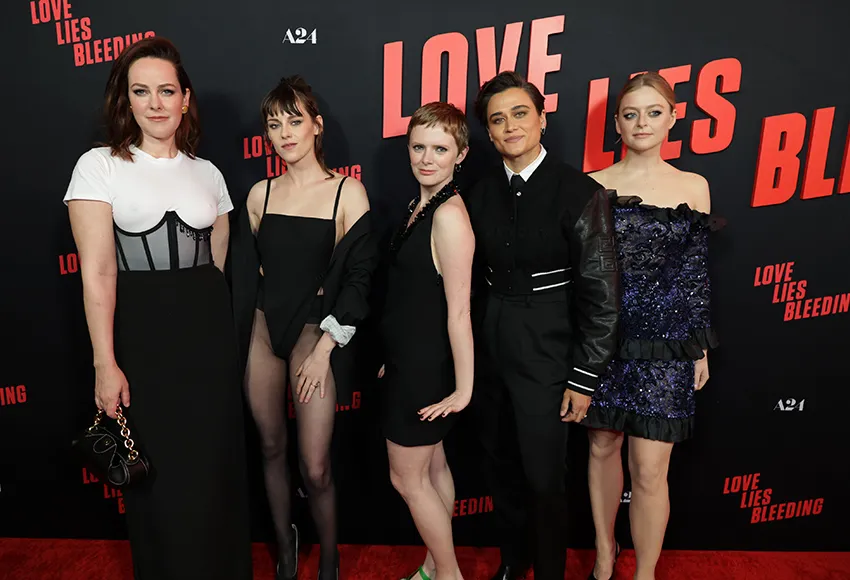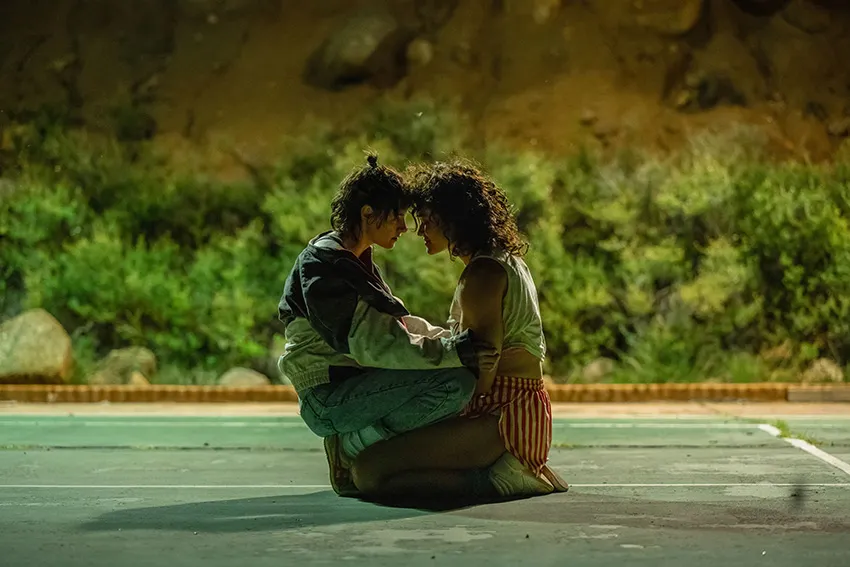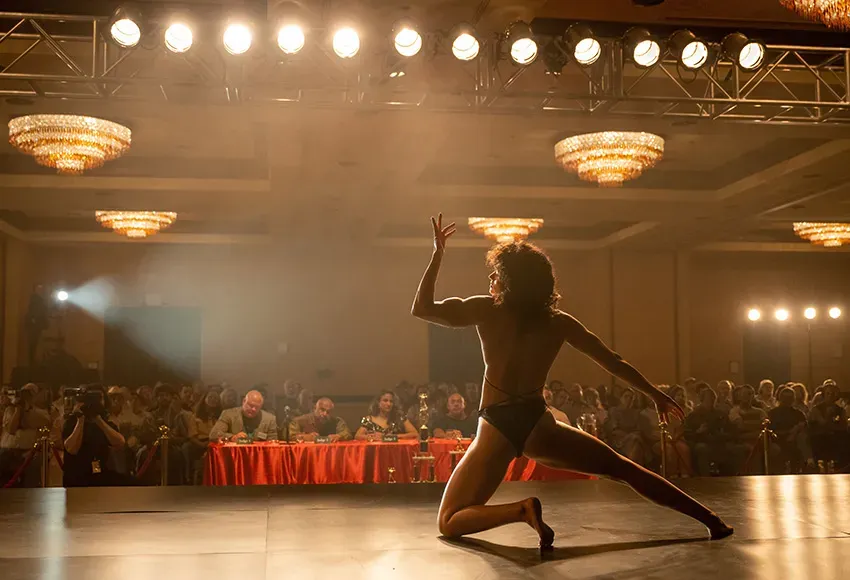Love Lies Bleeding is an exhilarating neo-noir featuring megastar Kristen Stewart and newcomer Katy O'Brian as a pair of star-crossed Lesbian lovers who, after a surreal series of events, find themselves neck-deep in gun-running, addiction, familial trauma, and cold-blooded murder. The film is a hallucinatory marvel that never follows the expected path, and in which events build to an idiosyncratically inventive conclusion that euphorically blew me away.
Set in small New Mexico town circa 1989, the story follows gym manager Lou (Stewart) and wannabe bodybuilding superstar Jackie (O'Brian). The former wants to live as quietly as she can, attempting to look after her sister Beth (Jena Malone) – currently in an abusive marriage to an otherwise emasculated drunken lout named JJ (Dave Franco) – while also staying as far away from her sinister, gun range–owning father Lou Sr. (Ed Harris). The latter is on her way to Las Vegas to compete in a giant bodybuilding competition, and she's decided to put down temporary roots in this slice of deserted American nowhere to focus on her training.
I'm not going to spoil what happens next. Just know that sparks fly when Lou and Jackie meet,as the pair almost instantaneously fall head over heels for one another.
I sat down with acclaimed director Rose Glass to chat about her freewheeling shot of character-driven nitroglycerin. The following are the edited transcripts of what the talented filmmaker had to say:

Sara Michelle Fetters: How do you go from the claustrophobic, internalized, almost overwhelming terror of Saint Maud into something that is so steeped in American noir with Love Lies Bleeding?
Rose Glass: It must have been some weird pressure-cooker buildup of frustration or something. I think the process of getting your first film made is so terrifying, and long and slow and uncertain and full of fear and self-doubt. Maybe the film [Saint Maud] reflects that a bit. I think coming through the second one, it was slightly widening this feeling and just wanting to take a big swing. To push myself out of my comfort zone a bit.
SMF: This film is also more of a creative collaboration, in that you worked with fellow filmmaker Weronika Tofilska on the script. What was that collaboration like, and how did you two come up with this particular story?
RG: It was wonderful. I loved the process of writing this with Weronika. We've been friends for years, so we already knew each other's tastes. She'd read drafts of Saint Maud, and I'd been reading her stuff. I hadn't tried cowriting before. It was a bit of an experiment, and it definitely leads you to places that you wouldn't get to by yourself.
I came to her with a little, embryonic version of the idea, which was basically just "bodybuilder has a mental and physical unraveling while training for their first big competition" and probably there'd be some murder involved. [Weronika] and me, we shared an office together and just locked ourselves in there and brainstormed. We gave each other permission to be led by what felt like the most exciting, fresh version of this story, whilst deliberately leaning into a lot of quite familiar tropes in hopes of doing something unexpected with them.
SMF: The movie almost feels an old-school noir, but then also a neo-noir. But then it also becomes a dark, pitch-black comedy, and then it also sometimes feels like it's a remake of a sci-fi film from the 1950s. It's like the two of you were doing all of this and dabbling and channeling your Ida Lupino meets Wim Wenders, and then all of a sudden you watched Attack of the 50-Foot Woman.
RG: [laughs] Well, yeah, it's probably some weird thing of two brains being smooshed together, and you end up with some quite strange results.
We're obviously both film nerds. We were mapping out the story as we went and probably, on some subconscious level, aware of trying to push against the idea of what a sensible or proper film that [is] made by a woman should be. I think both of us are quite frustrated by that notion of the idea that there's like a slight appetite for women filmmakers and characters to be somehow also morally righteous and upstanding in some way. I think we both very much enjoyed not doing that, and I think we've both got a fairly irreverent sense of humor. We were just trying to entertain each other as much as we could.
SMF: None of this would work if we did not believe Lou and Jackie were complete, three-dimensional characters. If their stories – and not just the stories that we see but the backstories that they bring in that you can only hint at – are lived. That these are lived experiences that these two women have had and then suddenly bring them together. How difficult was it to build these characters on the page, and then what was the process like when you brought Kristen and Katy in to inhabit them?
RG: The process of writing it was quite tricky, in that it's balancing a quite twisty-turny plot. As a feat of plotting and story mechanics, this was more involved than either of us had done before. But, like you said, [it depends on] grounding it in just two characters that you hopefully care about and buy, but at the same time balancing out the urge to not overexplain who they are or where they come from. To leave some things blank, so that people hopefully can piece things together themselves.
I think by making them very real characters, they can anchor the story. I think you're then able to reach further into the ridiculous, more far-reaching elements of the story if you ground [the script] in real people.

In terms of then integrating Kristen and Katy, it was a bit different for each of them. Kristen I had been picturing from pretty much the very beginning of writing the script. You go through the whole mental exercise of "who's the fantasy cast for each character?" There wasn't a fantasy cast for Jackie, because I couldn't think of anyone big and famous who looked like her. Whereas Kristen, we offered her the role [of Lu], and fortunately she liked the script. I think more than that, she liked Saint Maud. I'm not sure. I think with this script, she was like, "I'm not sure what this is, but let's go for it." [laughs]
But because of that, I was able to write Lou for her. I was writing it picturing Kristen, and then Kristen said yes, so I could keep writing it for her. Hopefully her interpretation of the character aligns with what I was hoping. I don't know. I just think it is really fun to see her do something so crazy. I think she's really funny in the film, and it plays into the obviously moody, angsty side of her, which people seem to love and vilify in equal measure, depending on where you come down on it. I just let her really lay into that and have her play a character who's kind of a terrible asshole, really, but also lovable, really likable, super charismatic, and kind of a heartthrob. Kristen's a real movie star.
Katy – I was checking with her recently – I think it was literally two weeks before we started shooting when we cast her.
SMF: Oh my gosh.
RG: Right? [laughs] Which was very stressful. We were already out in Albuquerque doing all this prep, and we'd seen so many people, hundreds of tapes. In the end, she sent one in, and it was just a massive relief. She's incredible. It was like, why didn't we find each other sooner? She's perfect.
They both bring so much to [the film]. I think what I love about Katy is that, obviously, she's got this incredible muscular physicality, and she can very effortlessly switch into this action hero, more hardened character. But also very quickly, and just beneath the surface, she's actually a real softie, very sweet and kind of vulnerable. Even though her character does a lot of really terrible things, she's the innocent of the piece.
SMF: In a lot of ways, this is a story about addiction and dealing with internalized traumas. Yet also, it's also about coming to grips with that euphoria of falling in love. It's interesting that you say Lou and Jackie do these terrible things, but a lot of it is coming from a place of either trying to overcome these various traumas and addictions, or it's because they're just so in love with one another that they lose sight of what it is that they're doing. Maybe all of this makes them entirely wrong for one another. Am I reading too much into all of this?
RG: No. Not at all. If anything, I think that probably anyone who does anything terrible thinks they've got quite a good reason for doing it. I guess what I like about a film is being able to be put in the shoes of somebody doing something awful or extreme or something. On the surface, you're like, I would never do that. But then hopefully through the story, you're like, shit, maybe given different circumstances, I could commit a terrible [crime].
I never wanted this to be the version of the story where these two are saints and everyone around them is bad, that it's them against the world. It's quite simply in the beginning: The men are awful. Unquestionably. But the women get to be awful too. That's by design.
Also, there is their romance. Hopefully you're rooting for them to stay together while simultaneously being aware that it seems to be a pretty terrible combination. The idea the things we want aren't necessarily the best things for us, that's another level to their relationship.
SMF: It's so nice to see openly Queer characters who are not defined by just their sexuality, by being Lesbians. They're allowed to have flaws, to be fallible. They're allowed to do some horrible things. But we're also still allowed to love and adore them. We want to see them succeed.
RG: And their sexuality isn't the main obstacle! I feel like probably, given the time and place the film is set, that maybe they probably would have encountered more homophobia than the characters do in this film. But it's like, that's there, but it's not the forefront of the story. This is not a coming out story. It's not about the fact they're Queer. They just are. That was fun to do.
SMF: You also get to display your horror chops a little bit at times here. There's quite literally a jaw-splitting moment in the movie that is going to have people...well...let's just say the shriek that went through the audience was incredible. But for you, how do you know how much to show and when to pull back? Was there ever a worry that you could get too extreme?
RG: No. There wasn't. In a way, the title [Love Lies Bleeding] was almost a statement of intent. From the beginning, given how melodramatic the title is, there's going to be a lot of violence, and there's going to be a lot of sex, and that's all good, clean fun. Well, not so clean, maybe. [laughs]
It's often just a balancing up of what you can pull off practically, what you can actually get away with showing convincingly. The head-splitting bit you refer to, I think we wanted, at some point, to have a big close-up where you see it actually happening. But then that leads you to other difficulties. So it becomes an off-screen thing that you play mostly through the sound and Jackie's reaction or through other characters' reactions. Sometimes not showing is better, because people's imaginations fill in the gaps in a more gnarly way than you could have actually done on screen.
But there was very little pulling back in the film. Generally, the notes I was giving to most of the departments, the actors, and the crew was like, go for it. This was never going to be an exercise in subtlety.
SMF: For audiences, now that Love Lies Bleeding is coming off the festival screenings and going into wide theatrical release, what do you want audiences to take away? What are you hoping that they're talking about when they're leaving the theater?
RG: I'm so shit at answering this question. My glib answer is that I hope they take away that it's very difficult to quit smoking and you should never start. [laughs]
I hope they just have a lot of fun. It seems to be being received wonderfully by people who we hoped would like it. Maybe I'm trying to have my cake and eat it, but to me, I'm like, I feel it has something for everyone. I'm hoping people who maybe on the surface might be like, I'm not sure those characters are for me – because maybe they're not used to seeing films with these kinds of women at the lead – will still take a chance. I think it's a very warm, inclusive film.
I'm delighted when people come out of it being like, "That was really funny! That was fun!" I'm like, see? I told you. I really appreciate that.


